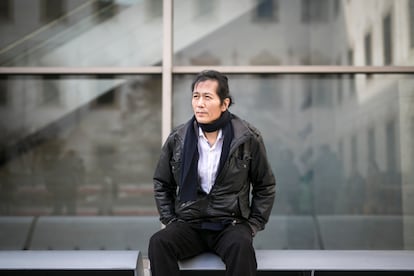Philosopher Byung-Chul Han, 2025 Princess of Asturias Award Winner for Communication and Humanities

Byung-Chul Han, the German thinker of South Korean origin , has been awarded the Princess of Asturias Award for Communication and Humanities. The jury, which had to choose from 47 candidates from 16 nationalities, highlighted in its argument the philosopher's "brilliance" in "interpreting the challenges of technological society" and his extraordinary ability to communicate new ideas precisely and directly that draw on philosophical traditions from both East and West. Other winners in previous editions include Marjane Satrapi, Nuccio Ordine, Adam Michnik, and Gloria Steinem. The award will be presented, along with those for other disciplines, in the autumn at the Campoamor Theatre in Oviedo.
Han is a popular favorite. His books (such as The Society of Fatigue, The Expulsion of the Different, The Scent of Time, The Society of Transparency, etc., published in Spain by publishers such as Herder and Taurus), short, informative, full of references to the history of philosophy and focused on contemporary issues, have become international bestsellers . Popular success, as in Han's case, is sometimes at odds with unanimous acceptance in academia. And from there, he has been criticized precisely for his prolificacy, his popularizing approach, a certain superficiality, and for telling the reader what, in some ways, they already know. His fame, as has also been said of Slavoj Zizek , far exceeds his actual contribution to the field of philosophy.
Always grounded in what happens in our daily lives, Han criticizes the most characteristic aspects of contemporary society and the dominant economic dogma. “Only a repressive regime provokes resistance. On the contrary, the neoliberal regime, which does not oppress freedom, but rather exploits it, faces no resistance. It is not repressive, but seductive. Domination becomes complete the moment it presents itself as freedom,” the thinker said in an exclusive interview with this newspaper in 2018 .

It thus opposes the growing acceleration and exploitation (sometimes self-exploitation) to which we are subjected, the culture of performance and the hyper-technological transformation of personal relationships and vital matters, the hyper-consumption and commodification inherent in neoliberal capitalism, and the resulting widespread anxiety and depression.
“In depression, we lose our connection with the world, with others. We sink into a diffuse ego. I think digitalization, and with it the smartphone, turns us into depressives,” he said in the aforementioned interview. And he leads by example: he is known for his love of gardening and thus recovering the rhythms of nature (a stance, by the way, that may come from his Eastern origins). “We need information to be silenced. Otherwise, our brains will end up exploding. Today, we perceive the world through information. This is how we lose the present experience. We increasingly disconnect from the world. We are losing the world,” he added.
Han arrived in Germany at 22, deceiving his parents, saying he was going to study metallurgy. In reality, he was going to study philosophy at the University of Freiburg. His father is an engineer, so he considers his humanistic side a "mutation." He never saw anyone reading a book in his home. The author often poses in a black leather jacket, sometimes with long hair, striking a rock star pose, and tends to cultivate a certain aura of mystery and inaccessibility around him. He smokes a pipe, as is expected of someone who thinks. He declares himself a lazy thinker who writes few lines a day. He likes to cultivate slowness, not only in his garden, but also while playing pieces by Bach and Schumann on his Steinway grand piano (he has two other Blüthners and is fascinated by the Goldberg Variations, which he taught himself). "I have to play every day, otherwise I get sick," he said when this newspaper visited him in Berlin in 2023 . “Even when I travel. That's why I don't travel that much.”
He is not a staunch defender of individual freedom, as he declared during that visit. “As Marx said, this individual freedom is the cunning of capital. We think we are free, but deep down, we produce, we increase capital. In other words, capital uses individual freedom to reproduce itself. This means that we, with our individual freedom, are merely the sexual organs of capital.” And he upheld one of his central ideas: “Under the compulsion of performance and production, there is no possible freedom. I force myself to produce more, to perform more, I optimize myself to the point of death; that is not freedom.”
The jury for the Princess of Asturias Award for Communication and Humanities, chaired by Miguel Falomir, director of the Prado Museum, included names such as Álex Grijelmo, Estrella de Diego, Alma Guillermoprieto, Cristina de Middel, and Carme Riera. Han's nomination was nominated by journalist Antonio Lucas. It remains to be seen whether Han, a lover of slowness and a hater of hustle and bustle, will break his habit of rarely traveling to collect the award from Princess Leonor in Oviedo.
EL PAÍS





